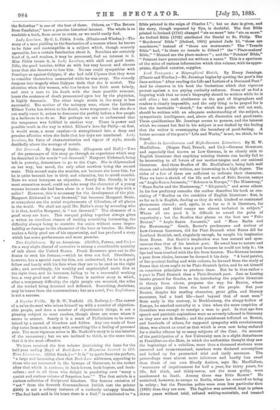to be false and contemptible is a subject which, though
scarcely agreeable, has a certain fascination about it. Novelists are certainly fond of it, and readers, it may be presumed, find an interest in it.
3Iiss Pirkis treats it, in Lady Lovelace, with skill and good taste.
Edie, the good heroine, trifles so with her very honest and sincere lover that she deserves to lose him. No one could sympathise with
Penelope as against Calypso, if she had told Ulysses that they were to consider themselves unmarried while he was away. The comedy deepens into tragedy when Calypso finds that she is mortal. The situation when this woman, who has broken her faith most falsely., and sent a man to his death with the least possible remorse, hears the sentence of death pronounced upon her by the physician, is highly dramatic. The other tragic strain in the story is less successful. The mother of the unhappy man, whom the faithless Ellinor Yorke has driven to his death, vows vengeance ; but she does not really exact it, unless to denounce the perfidy before a few people in a ballroom is to do so. But perhaps we are to understand that the vengeance was fulfilled in another way. There is power and possible truth in the way in which Ellinor's love for Philip—at first, it would seem, a mere caprice—is strengthened into a deep and genuine affection when she finds that her days are numbered. Lady Lovelace, for force of characterisation and vigour of style, stands decidedly above the average of novels.


































 Previous page
Previous page